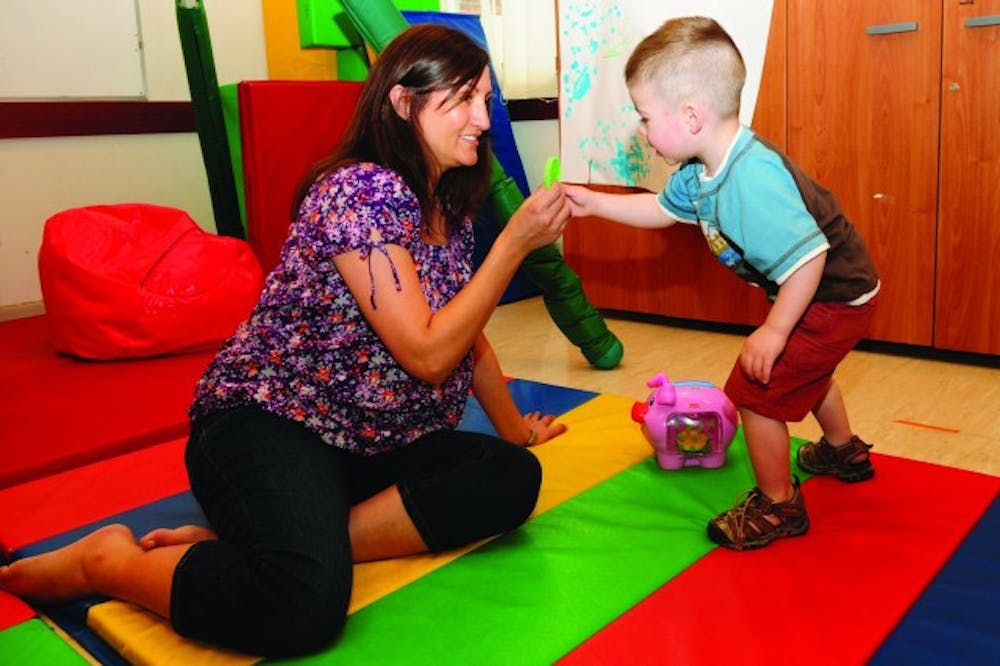Students in the dual degree program at Seton Hall are admitted into a program that allows them to pursue their undergraduate and graduate degrees simultaneously while offering them an accelerated course to graduate school.
The University offers dual degree programs in a variety of schools and majors, including communications, sciences, foreign languages, political sciences, English and education.
Kaitlin Neiswenter, a dual degree occupational therapy major, said she was inspired to start the occupational therapy program because of her little sister. She said she originally wanted to pursue a career in art therapy but changed her mind when her sister had to see an occupational therapist after being diagnosed with dyslexia. Neiswenter then looked up the career choice after seeing how they were able to help with her sister’s disability.
“I always wanted to work with kids,” Neiswenter said. “These kids come in with hard struggles and disabilities, and I just want to be able to give them the confidence to work through them.”
According to the Seton Hall website, the dual degree occupational therapy program is a 3+3 program. The student earns their B.A. in social and behavioral sciences in the first three years and their Master of Science in occupational therapy in the last three years. The curriculum allows the student to learn the traditional liberal arts course alongside prerequisites for the master’s program. The program also offers clinical internship opportunities.

Seton Hall offers occupational therapy as a 3+3 program.
Neiswenter is in her final semester of undergrad and is finishing up her prerequisites for occupational therapy and her psychology minor. She said she is taking classes like anatomy with specific focuses on kinesiology, neuroscience for occupational therapy, occupational therapy practice and occupational therapy process.
She has been able to shadow at a public school and private school. She said connecting with the kids was her favorite part of the experience. Neiswenter said the shadowing experience assured her that she chose the right career path despite how tough the program can be.
“You definitely have to have confidence in yourself,” Neiswenter said. “There were times that I doubted myself, but you have to push through and remember the reasons why you’re doing this.”
Kylem Spence, a senior biology major, is a part of the biology and physician assistant dual degree program. He initially came to Seton Hall with the intent of studying medicine.
“I wanted to come to the university to study medicine, and I heard Seton Hall had a solid program,” Spence said.
The biology and physician assistant dual degree program is a 3+3 program. It allows the student to complete their B.S. in biology by their junior year and to start their graduate physician’s assistant courses their senior year.
Anwar Kaikai, a dual degree physics and computer engineering major, said he always knew that he wanted to pursue computer engineering and saw an opportunity in the dual degree program to pursue a physics degree alongside that. He said that technology was something that came easily to him, and it was an easy decision for what major and career path he wanted to pursue.
“Growing up, I just started messing around with computer and tech stuff,” Kaikai said. “I used to help friends, families and people around my neighborhood with their tech issues.”
According to the University website, the physics and computer engineering dual degree major is a 3+2 program that offers the students a three-year plan to gain a B.S. in physics. The students can then finish their last two years pursuing their master’s in computer engineering at the New Jersey Institute of Technology.
This program also offers research opportunities with faculty members as well as internships from employers such as the U.S. Department of Defense, Ford Motor Company, Lockheed Martin and Brookhaven National Laboratory. The school is also currently working to implement a similar 3+2 dual degree program with Stevens Institute of Technology.
Kaikai is in his final semester of his undergraduate degree. Although he has been able to take a couple of coding and computer classes in the program, he still teaches himself coding on the side to prepare for his master’s program. Though he says he knows how tough the major can be, Kaikai is insistent about pursuing his career as a software developer to create new and innovative programming.
Andrew Byrd can be reached at andrew.byrd@student.shu.edu.





